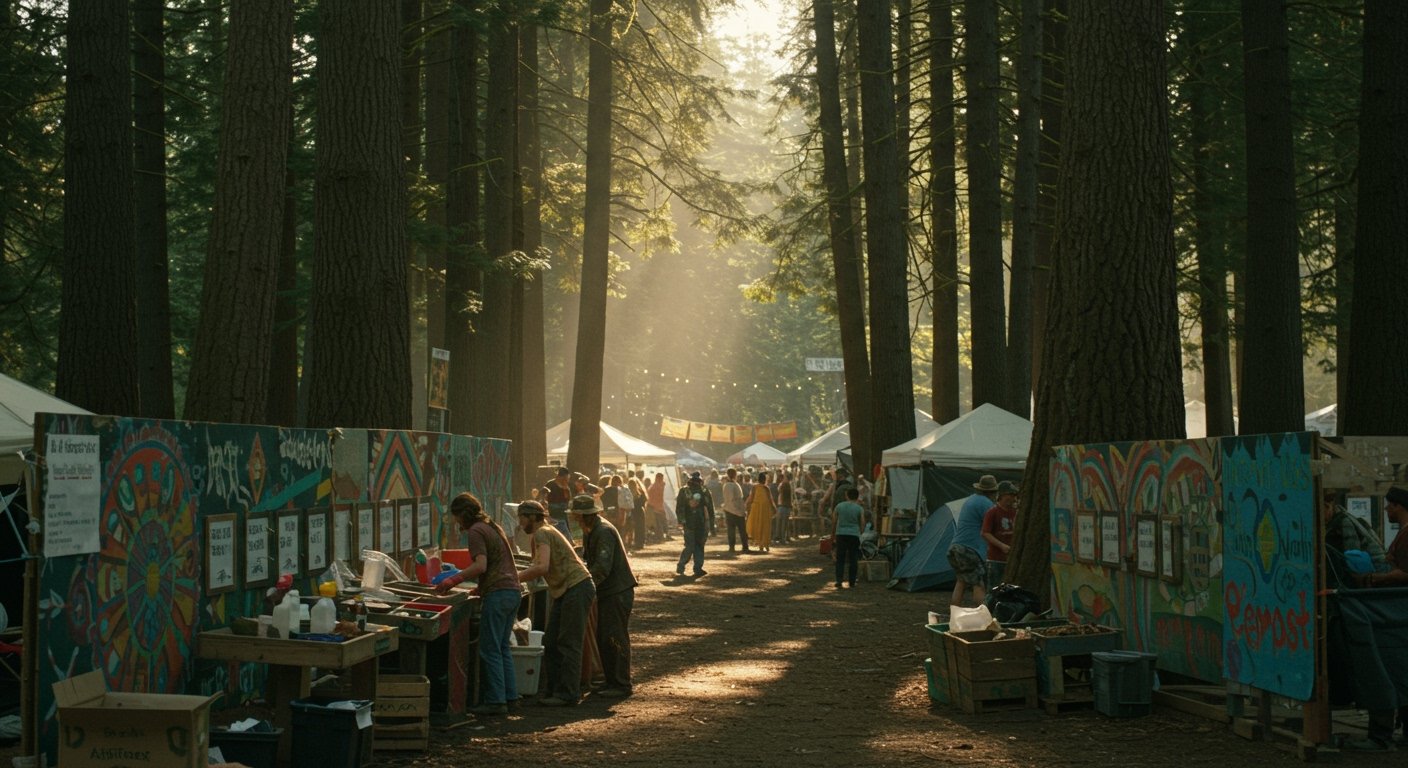VENETA, Ore. – What began as a celebration rooted in the 1960s counterculture movement in the forests of Oregon has quietly cultivated a legacy of environmental stewardship that now offers profound lessons for modern sustainability practices. The Oregon Country Fair, an annual three-day event held near Veneta, has for decades embodied principles of “living differently” and “caring for the earth,” shaping an approach to event management that prioritizes ecological responsibility.
Scheduled this year for July 11-13, running daily from 11 a.m. to 7 p.m., the fair is more than just an arts and music gathering; it is a living laboratory for sustainable living. Its environmental ethos, once considered “fringy,” is increasingly recognized as prescient, influencing how large events and communities approach waste, resources, and land interaction.
Roots in Counterculture and Core Principles
The fair’s origins in the vibrant counterculture of the 1960s instilled a deep connection to the land and a desire to exist in harmony with nature. This philosophy wasn’t academic; it was practical, driving innovations in resource management born out of necessity and principle. According to Prozanski, an organizer with the fair, the core tenets of “living differently” and “caring for the earth” remain central to the event’s operation and identity today. This commitment permeates all aspects of the fair, from vendor requirements to attendee education.
The guiding philosophy for many involved is perhaps best encapsulated by a question posed by Glenn Gregorio, a volunteer with VegManEC, one of the fair’s environmental crews: “Am I expressing reverence for the land?” This simple, yet powerful, query serves as a touchstone for decision-making regarding activities and infrastructure within the fairgrounds.
Pioneering Waste Management Practices
One of the most visible and impactful areas where the Oregon Country Fair has demonstrated leadership is in waste management. Long before extensive municipal recycling and composting programs were commonplace, the fair was developing sophisticated systems to minimize its environmental footprint. The event’s commitment to reducing landfill waste is a cornerstone of its sustainability efforts, serving as a tangible measure of its success.
Recent data highlights the effectiveness of these programs. In the most recent year for which figures are available, the fair sent 23 tons of trash to the landfill. This represents a significant reduction from the 30 tons sent in 2023, illustrating continuous improvement in waste diversion. This notable decrease is attributed, in part, to increased compliance with regulations requiring the use of compostable service ware by vendors and food booths.
The Central Role of Composting and Volunteers
The reduction in landfill waste is heavily reliant on the fair’s robust composting program. Thom Barr, the composting crew coordinator, emphasized the critical role composting plays within the fair’s overall recycling and waste management strategy. Organic waste, instead of being buried in a landfill, is transformed into valuable soil amendments, closing the loop on the consumption cycle within the fairgrounds.
The success of these intricate systems is powered by a dedicated network of volunteers, like Glenn Gregorio and those on Thom Barr’s crew. These individuals are the hands-on implementers of the fair’s environmental vision, educating attendees, sorting waste streams, and ensuring compliance with the fair’s strict environmental guidelines. Their work embodies the principles of collective responsibility and active stewardship.
A Model for Modern Events and Beyond
The environmental practices honed over decades at the Oregon Country Fair, though born from a specific countercultural context, now serve as a practical model for event organizers, communities, and individuals seeking to reduce their ecological impact. The fair demonstrated that large gatherings could implement effective waste diversion, resource conservation, and mindful interaction with the environment long before these concepts gained widespread mainstream traction.
Its experience provides valuable insights into logistical challenges, behavioral change, and the power of community engagement in achieving ambitious sustainability goals. The fair’s journey from “fringy” idealism to a recognized leader in event environmentalism highlights the potential for grassroots initiatives to drive broader societal change.
As the Oregon Country Fair prepares for its next iteration from July 11-13, it continues its tradition of blending vibrant artistic expression with a deep and abiding commitment to environmental stewardship. Its legacy serves as a reminder that caring for the earth is not a separate activity, but an integrated way of life, essential for sustainable events and a sustainable future. More information about the event and its environmental initiatives can be found on its official website, oregoncountryfair.org.




